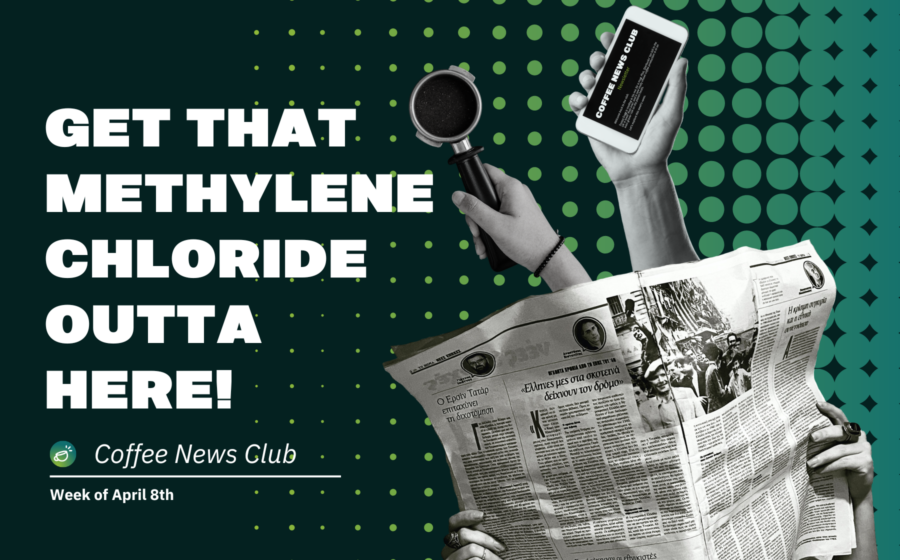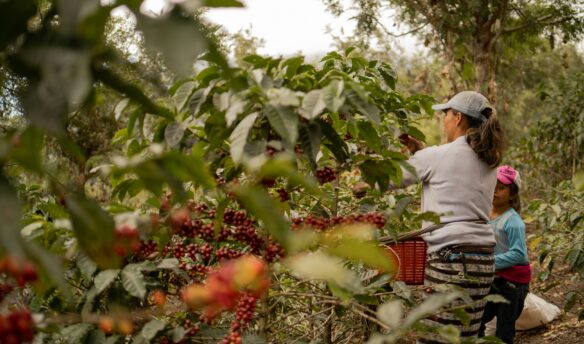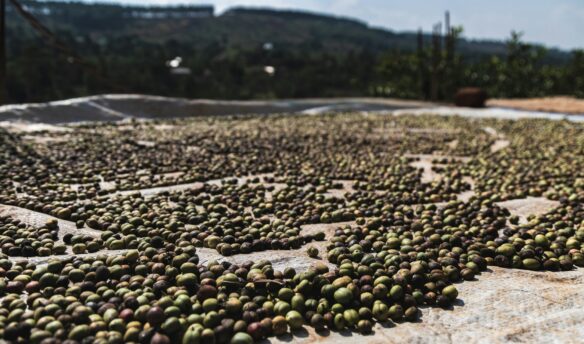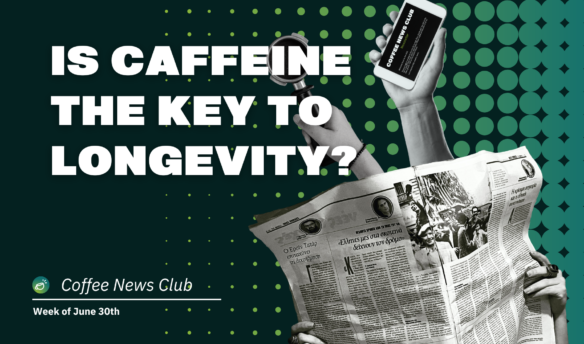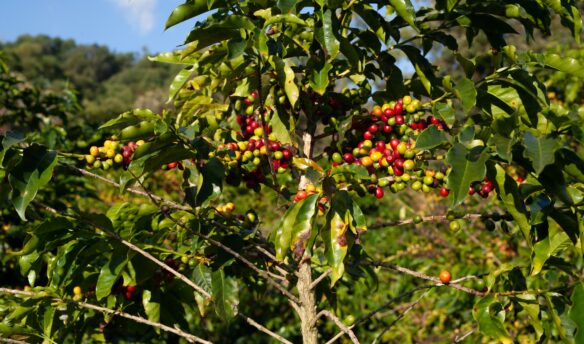Robusta prices are going up, minimum wage laws pass—and big companies are passing on the costs to consumers. Plus, unions galore as workers organize at Blue Bottle Coffee and Bluestone Lane.
‘Robusta Coffee Hits Fresh Record as Dry Weather Risks Next Crop’ – via Bloomberg
Dry weather has hit Vietnam hard, impacting coffee harvests and pushing the price of robusta to ever-higher levels. Futures contracts on the Intercontinental Exchange’s London market have risen over 30% this year, and the ripple effects from the drought could impact the wider coffee industry.
Traders at the London-based importer DRWakefield told Bloomberg the weather conditions in Vietnam are “not encouraging,” saying that “there are still concerns over a possible water shortage for irrigation, which may hurt the output of the next season.”
Drought conditions are not the only thing impacting production: in a previous article on the country’s shrinking coffee production, Bloomberg noted that lower production has also been exacerbated by farmers switching to more profitable crops such as durian and avocados.
The spike in robusta prices isn’t simply a result of weather. Price increases could also come from “panic buying by roasters” waiting out price surges in hopes of a market realignment. But the price never dropped, and now they’re running out of coffee. This might explain the associated increase in the arabica futures market: “Brokers in top grower Brazil recently reported high demand for lower quality arabica beans that can be used by roasters as a replacement for robusta in blends,” Bloomberg reports.
Meanwhile, the Financial Times connects the dots between high prices, low production, and booming demand, predicting a “squeeze [in] Asia’s café culture.” The article details the struggles of farmers in Vietnam and Indonesia to produce coffee in increasingly erratic climatic conditions and points to soaring demand in countries like Japan, China, and Indonesia itself as an explanation for rising prices.
The article concludes, “This is bad news for coffee fans across the region. These companies have little choice but to pass costs on to consumers.”
‘Californians Could Pay $200 More A Year for Their Starbucks Habit’ – via Business Insider
Speaking of passing on the costs…
A new state law in California passed April 1 mandating a $20 minimum wage for fast-food workers at companies with more than 60 locations nationwide. And already, Starbucks has hiked its prices in response.
Business Insider found that the megachain increased its prices between 50 cents and $1. They calculated this could add up to $208 yearly for a single menu item if you “treat yourself to Starbucks each workday.”
Instead of framing the new law as necessary in a state where the cost of living is 38% higher than the national average, the article—and others like it—pits consumers and workers against each other. “It’s hard for some regular drinkers to swallow the change, even if they agree their baristas should be paid more,” Business Insider states.
Workers fear customers could blame them for the price increases. “As if we don’t get harassed enough,” one Starbucks worker wrote on Reddit.
Starbucks reported record revenue in the first fiscal quarter of 2024. In North America alone, net revenue grew to $7.1 billion, representing a 9% increase over the same period as last year.
‘Five Blue Bottle Coffee Locations in Greater Boston Unionize’ – via Boston Globe
Workers at five Boston-area Blue Bottle Coffee locations are unionizing. Representing around 50 employees, organizers have written to the company requesting voluntary recognition of the Blue Bottle Independent Union (BBIU).
“We are unionizing because Blue Bottle does not pay us enough to meet our basic needs, does not allow us any input into cafe operations, and shows continuous disdain for us as workers,” the union wrote in a statement. “As baristas, we are the face of the company and produce Blue Bottle’s value, and yet we struggle to make ends meet despite working full time.”
Blue Bottle was founded by James Freeman in 2002 and quickly became one of third-wave coffee’s trailblazers. Nestlé bought a majority stake in the company in 2017, and today, Blue Bottle has locations in Japan, Hong Kong, China, and South Korea, as well as over 70 cafes in the United States.
The letter requests voluntary recognition by Monday, April 8. If Blue Bottle refuses, the workers plan to petition the National Labor Relations Board for a union vote.
BBIU represents all but one of the chain’s Massachusetts locations, and workers told the Boston Globe that the high turnover of managers, lack of training, and allegations of harassment made organizing essential. “There needs to be more accountability between workers and management at Blue Bottle,” said Piper Milliken, a shift lead at the Newbury Street location. “We will not tolerate these conditions any longer.”
Boston has become a coffee organizing hotbed in recent years, with unions at local cafes Pavement, 1369 Coffee House, Diesel Cafe, and several Starbucks locations. Unlike most other unions, BBIU will remain independent rather than become affiliated with a larger organization such as Workers United or UNITE Here. “Our independent structure allows us to have direct democratic control of our demands, campaign strategy, finances, and anything else pertaining to the union,” the workers state.
More News
‘Volcafe Joins ILO Child Labor Platform‘ – via Global Coffee Report
‘Brewing Equipment Specialists Unite as Torr Acquires Brew Bomb Brand’ – via Daily Coffee News
‘Dillinger Escape Plan Guitarist Opening Alkemy Coffee Co In New Jersey‘ – via Sprudge
‘Louis Dreyfus Buys Brazilian Solubles Manufacturer Cacique‘ – via STiR Coffee and Tea
‘SCA presents 2024 Sustainability Award Winners’ – via Global Coffee Report
‘WCR Report Outlines Striking Nonconformity in the Coffee Seed Sector’ – via Daily Coffee News
The Week in Coffee Unionizing
Another win for Philadelphia’s cafe union, Local 80, came after workers at Bluestone Lane’s three Philly locations petitioned to unionize. Organizers sent a letter to the CEO of the Australian-inspired coffee chain asking for voluntary recognition of their union.
Bluestone Lane employees took inspiration from Local 80’s efforts at other Philadelphia coffee shops, such as Elixr, Ultimo, and ReAnimator, which helped workers ratify contracts at their respective stores. Although Local 80 has lost some battles—workers at Good Karma Cafe and two of Ultimo’s four locations voted to decertify their unions, and Korshak Bagels closed down after its staff unionized—they have gained new members from Vibrant Coffee Roasters, which unionized in late 2023.
Among the issues Bluestone Lane workers want to address are infrastructure problems like sporadic power outages in winter, as well as lack of staff and high management turnover. There’s also the issue of pay: workers say that front-of-house staff earn a base rate of $7.25 per hour, compared with between $13.75 and $14 at unionized Elixr, ReAnimator, and Ultimo.
“We have a lot of hope for this organizing and a lot of faith in the power of coming together to make these changes for us and for people to come, too,” Bluestone Lane worker Trista Mayo told the Philadelphia Inquirer. “We love working with each other. We do love the locals that we serve and the relationships that we’ve formed with them. If we didn’t care that much, we’d get up and we’d go somewhere else, but we really do care.”
Meanwhile, the Starbucks organizing drive shows no signs of slowing down, as workers across the US won their union elections. Locations in Virginia, Louisiana, Illinois, and two shops in New York all voted to join Starbucks Workers United.
Plus, a Grand Forks store became the first Starbucks in North Dakota to unionize. “It’s a big change, it’s something new, it’s something that has not happened yet in this state,” said barista Haleigh Johnson. “It’s a process but we’re going through it together and we’re going to figure it all out together.”
Is Coffee Good For You?
Remember the story about lawmakers in California trying to ban coffee decaffeinated with methylene chloride? CNN decided to find out whether the chemical is actually harmful and if caffeine-sensitive people should switch to another decaf process.
Methylene chloride is a solvent used in “European method” decaffeination. It bonds with and removes caffeine molecules within the coffee bean, and any trace amounts evaporate during storage or roasting.
In addition to the proposed California legislation, a group of nonprofits petitioned the United States Food and Drug Administration (FDA) to amend the FDA’s food additive regulations and prohibit methylene chloride in food production. In their quest to discover the health risks of methylene chloride, CNN spoke to someone from one of those nonprofits.
“In addition to being carcinogenic, methylene chloride can cause other health harms, such as liver toxicity and at higher exposures neurological effects, and in some cases death,” said Dr. Maria Doa, senior director of chemical policy for the Environmental Defense Fund.
Then they contacted the FDA, which said that “while methylene chloride may be indirectly involved in food processing, such as in the decaffeination of coffee beans, residue limits have been set to limit exposure. Any food product that contains residues of methylene chloride above the established limits are not permitted for sale or consumption.”
Registered dietician Monique Richards sits somewhere in the middle: “We are exposed to so many things now that anything we can control or ask questions about and decrease that exposure that may be harmful is going to be advantageous.” However, Richard says, “There still isn’t a lot of clear or conclusive research that ingesting residual levels in coffee specifically will cause cancer or other problems.”
While CNN didn’t ask the National Coffee Association for its take, the organization has previously spoken up for decaf. In response to this most recent attack on coffee’s health benefits, NCA CEO William “Bill” Murray said in a press release that “banning European Method decaf would defy science and harm Americans’ health. The overwhelming weight of independent scientific evidence shows that drinking European Method decaf is safe and furthermore that drinking European Method decaf, like all coffee, is associated with decreased risk of multiple cancers and other significant health benefits.”
Beyond the Headlines
‘Think Your $5 Flat White Costs Too Much? It’s Actually Too Cheap’ by Emma Felton



